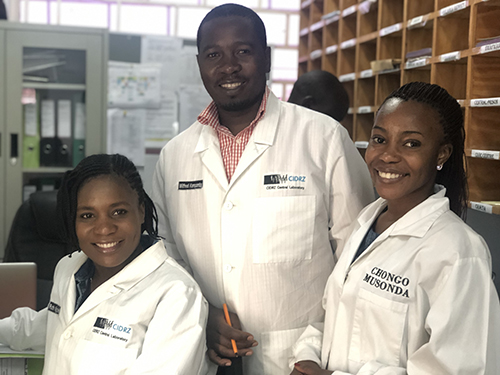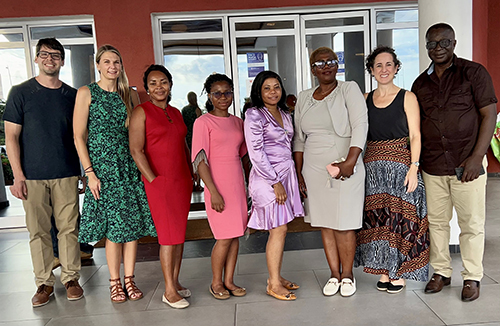 Jodie Dionne, M.D.Jodie Dionne, M.D., associate director of Global Health in the UAB Center for Women’s Reproductive Health and associate professor in the Department of Medicine, is working on a new R01 funded by NIH/NIAID focused on helping pregnant mothers keep their unborn babies safe from syphilis.
Jodie Dionne, M.D.Jodie Dionne, M.D., associate director of Global Health in the UAB Center for Women’s Reproductive Health and associate professor in the Department of Medicine, is working on a new R01 funded by NIH/NIAID focused on helping pregnant mothers keep their unborn babies safe from syphilis.
Syphilis is a serious infection that can be transmitted by a pregnant mother to her baby. If it's not diagnosed and treated in time, it can lead to problems like miscarriage, stillbirth, low birth weight, preterm birth, congenital syphilis, and even newborn death. Dionne’s team, along with others, has found that syphilis is quite common in pregnant women in Cameroon and Zambia, including among women living with HIV.
Dionne is leading this study, “Syphilis in Pregnancy Study: Molecular Diagnostics and Maternal and Infant Response to Infection” (SIPS), with Mwangelwa Mubiana-Mbewe, MBChB, MMed, director of Paediatrics & Child Health for the Centre for Infectious Disease Research in Zambia (CIDRZ) and Lorenzo Giacani, Ph.D., associate professor in the Department of Medicine at the University of Washington in Seattle.
The goal of this study is to improve diagnostic testing for syphilis in pregnant women and their babies. It will check how the immune system responds to syphilis in pregnant women and babies before and after they receive a penicillin treatment. This will help in discovering signs that show if someone is protected from syphilis and can guide future research on vaccines.
“Fortunately, syphilis is very treatable in women and infants, and all of the pregnant women in the study will be treated,” said Dionne. “Syphilis in pregnancy is treated with penicillin antibiotics with very high cure rates. Many women with an infection don’t have any symptoms, so routine testing during prenatal care is very important.”
 CIDRZ teamThe team has brought together experts in infectious diseases, syphilis biology, and the immune system to answer important questions about syphilis in pregnant women and how it affects their babies. They are studying 750 pregnant women with syphilis and their babies in Cameroon and Zambia and 750 pregnant women without syphilis.
CIDRZ teamThe team has brought together experts in infectious diseases, syphilis biology, and the immune system to answer important questions about syphilis in pregnant women and how it affects their babies. They are studying 750 pregnant women with syphilis and their babies in Cameroon and Zambia and 750 pregnant women without syphilis.
“In order to enroll 750 pregnant women with syphilis in Zambia and Cameroon and assess the immune response in women and infants, it requires a large multidisciplinary team,” said Dionne. “This new SIPS study builds nicely on prior syphilis studies I have conducted with Drs. Giacani in Seattle and Mubiana-Mbewe in Zambia. Everyone brings important expertise to the team effort. Dr. Giacani is an expert in the biology of the bacterial pathogen that causes syphilis (Treponema pallidum), and Dr. Mubiana-Mbewe is an expert pediatric infectious diseases doctor and a leader at CIDRZ. We will also be working with Drs. Pius Tih in Cameroon, Albert Manasyan and Victor Mudenda in Zambia, and Anju Bansal here at UAB.”
We sat down with Dr. Dionne to discuss this study and learn more about the global health impact of her research.
Q: How does this study tie into your previous global health research?
 CHI UAB teamOver the past decade, I have led a number of clinical trials focused on preventing infection in pregnancy in Africa with the support of my research team and scientific partners located in Cameroon and at UAB. This work is conducted as part of the longstanding Cameroon Health Initiative at UAB (CHI UAB) and in collaboration with CIDRZ in Zambia. Our studies have enrolled or are enrolling pregnant women with malaria, hepatitis B, and sexually transmitted infections, such as syphilis.
CHI UAB teamOver the past decade, I have led a number of clinical trials focused on preventing infection in pregnancy in Africa with the support of my research team and scientific partners located in Cameroon and at UAB. This work is conducted as part of the longstanding Cameroon Health Initiative at UAB (CHI UAB) and in collaboration with CIDRZ in Zambia. Our studies have enrolled or are enrolling pregnant women with malaria, hepatitis B, and sexually transmitted infections, such as syphilis.
The big picture for our global team is to work together to test new ways to improve maternal and infant health in Africa and in the U.S. We focus on common infections that can be treated and prevented in many cases. SIPS fits well into the big picture of our long-term goals.
Q: What is the global health application of the work you are doing in Cameroon and Zambia for other populations worldwide?
Unfortunately, syphilis in pregnancy is a common problem not only in Africa but also in the U.S. and even here in our home state of Alabama. Thousands of women and infants around the world would benefit from improved diagnostic testing for syphilis in pregnancy and infants and progress toward a syphilis vaccine. We have designed the SIPS study to contribute to those efforts.
Q: Are there opportunities for others at UAB to get involved in this study?
Yes, definitely. We always work to include trainees in Africa and in the U.S. in our research projects. This is another important long-term goal of CHI UAB. Anyone with interest in partnering with us is welcome to reach out to me directly.
If you are interested in collaborating with Dr. Dionne, reach out to her at